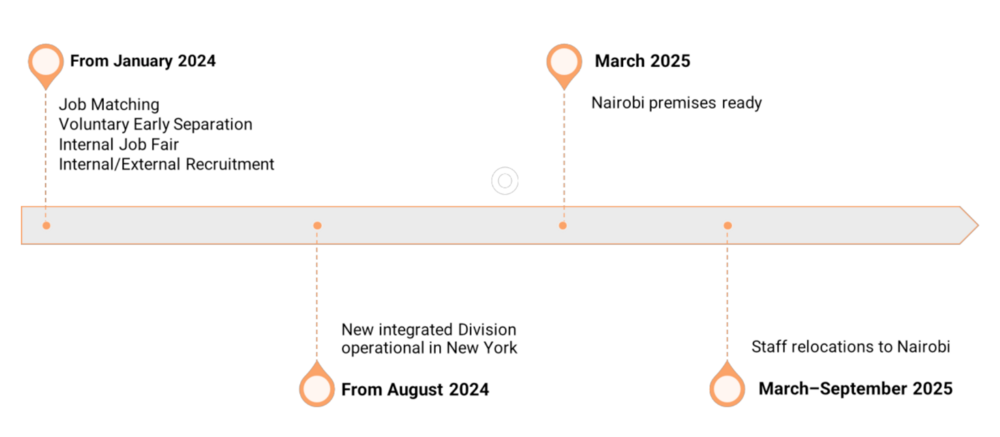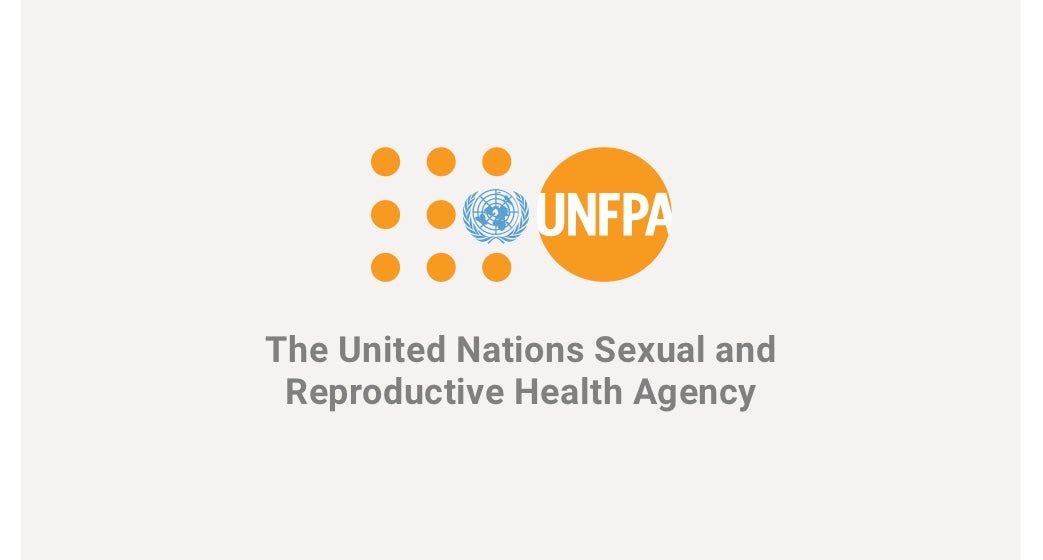UNFPA HQ Optimization
A bold vision for delivering on the three transformative results
The UNFPA HQ Optimization initiative is driven by a strategic vision to reinvigorate, reimagine and transform UNFPA to make sure that it is future-fit and strategically positioned to deliver on its mandate, in alignment with the ICPD Programme of Action, the 2030 Agenda for Sustainable Development and the Secretary-General’s vision for a UN 2.0.
Introduction
The HQ Optimization initiative refers to the organizational changes that are currently being implemented at UNFPA to maximize the effectiveness and efficiency of the organization’s headquarters. This page aims to clarify the scope, rationale and impact of the HQ Optimization initiative.
UNFPA – fit for the future
As the Board-approved UNFPA Strategic Plan 2022–2025 stresses, transforming the world also requires reinvigorating and transforming UNFPA, in line with the United Nations reform. The landscape UNFPA operates in is changing rapidly – with climate change, demographic shifts, growing inequalities, and technological advancements reshaping the world. UNFPA has a choice: be swept along by the change happening all around us, or become the drivers of our future.
To make UNFPA future-fit, it’s supremely advantageous to be closer to the
communities we serve, and to deliver in a more integrated way.
Dr. Natalia Kanem, Executive Director, UNFPA
UNFPA is, therefore, continuing its journey of essential organizational transformation, which has previously included important organizational changes, such as the realignment of the Division for Human Resources, the evolution of the Procurement Services Branch into a Supply Chain Management Unit, and the establishment of a Humanitarian Response Division in Geneva.
How are we changing?
In this context and as part of the HQ Optimization initiative, the following two organizational changes are to take place at the UNFPA headquarters:
- integrating the current Policy and Strategy Division and the current Technical Division into a Programme Division largely based in Nairobi;
- relocating the Evaluation Office to Nairobi.
UNFPA expects significant benefits from the integration of its technical and programme functions as well as the relocation of these functions – together with the evaluation function – to Nairobi, an important hub in the Global South.
The decision to proceed with these changes is based on in-depth organizational reviews that have taken place over the last few years and were informed by extensive consultations with staff from the impacted units. As part of one of these reviews, staff were specifically asked to quantify the amount of time spent working with stakeholders in New York versus non-New York-based stakeholders. These data fed into the decision of relocating the technical, programme and evaluation functions.
The changes are in line with reorganizations undertaken by other UN agencies to adapt to the changing work environment and to review their headquarters footprints and assess where headquarters functions can most effectively and efficiently be located.
What are the benefits from adopting a new organizational arrangement?
The benefits from the integration of UNFPA technical and programme functions and the new organizational structure include:
- enhanced support to country and regional offices through better inclusion of thematic inputs at all stages of the programme cycle;
- improved generation and dissemination of coordinated programming guidance and technical knowledge;
- more integrated family planning, maternal health and gender-based violence services to the last mile for communities that need our expertise the most;
- linked-up strategic planning, programming and technical support;
- more effective positioning of ICPD priorities; and
- alignment with arrangements adopted by other UN agencies.
Why Nairobi?
The benefits from the relocation to Nairobi include:
- strengthened presence where the need is the highest – nine of the ten countries with the highest maternal mortality rates are found in Africa and three out of the six regions in which UNFPA works reside on the African continent, with over 50 per cent of UNFPA total resources spent there;
- strengthened support to country and regional offices through time-zone centrality and closer geographic proximity to more regions;
- enhanced knowledge-sharing, partnerships, South-South cooperation, and capacity building in the Global South;
- savings on staff-related costs, office rental, and travel;
- enhanced staff well-being through reduced travel;
- reduction in carbon footprint; and
- participation and signal of commitment to One UN.
 Nairobi was selected through a thorough comparative analysis of duty stations in the North and the South based on criteria, such as staff safety and security, staff experience, UN presence, geographical accessibility, talent availability, and infrastructure.
Nairobi was selected through a thorough comparative analysis of duty stations in the North and the South based on criteria, such as staff safety and security, staff experience, UN presence, geographical accessibility, talent availability, and infrastructure.
In addition to fully meeting these criteria, Nairobi emerged as the best option, in light of the many opportunities it offers as a vibrant hub in the Global South.
How will UNFPA continue to play its normative role?
UNFPA takes its normative role very seriously in line with its decades-long commitment to advancing rights and choices and the ICPD Programme of Action.
As for the engagement in intergovernmental and interagency processes in New York, the changes have been designed to ensure UNFPA continued strong presence in New York.
In addition, UNFPA engagement and positioning in intergovernmental and interagency processes in New York will be ensured by, inter alia:
- senior management;
- a robust Programme Liaison Branch, functionally part of the new Programme Division, encompassing programme and thematic expertise and headed at a senior level; and
- the Executive Board Branch, which supports engagement with the Executive Board.
The strength of the UNFPA normative role does not depend only on where HQ functions are based. In fact, UNFPA country and regional offices play a key role in that respect, and we expect that the strengthened support that they will receive through the integration of programme and technical functions and the closer proximity of the new Programme Division will indeed enhance the normative role played by UNFPA country and regional offices.
When will the change happen?
The implementation of the HQ Optimization initiative started in September 2023. It is foreseen that the process will be completed over a period of approximately two years. As of August 2024, the Programme Division will be operating in New York, hence allowing the necessary time for the structure and the processes to be fine- tuned if needed, as well as for staff to cohere as part of a new organizational entity, ahead of the phased relocation to Nairobi, which will start in March 2025.
This timeline, which advanced the organizational design and human-resources actions, is specifically designed to ensure sufficient time for staff and the organization to plan for the future and ensure as seamless a transition as possible. This is considered a best practice based on the experiences of other UN agencies going through similar organizational restructurings. This timeline will also best help UNFPA manage the staffing of the new Programme Division.
In addition, this timing will align with the expiration of the lease for the current New York offices and will enable the organization to optimize the use of office space in New York, embracing modern, flexible working practices that reflect UNFPA commitment to adaptability and efficiency in a post-COVID world of work.

What does this mean for staff?
As a result of these organizational changes approximately 120 posts, mostly from New York, will be moved to Nairobi. The percentage of posts moving to Nairobi represents approximately 25 per cent of the current New York-based posts.
UNFPA management is particularly mindful of the situation of general service staff who are impacted by the changes and whose posts cannot be relocated to a different duty station. In order to minimize disruption for this staff group, UNFPA management is ensuring that relevant posts that become available are only advertised internally and affected staff are given preferential consideration. A Voluntary Early Separation programme should also allow for more opportunities for staff to have a post in New York. Proactive dialogue with other UN agencies is taking place to facilitate absorption of UNFPA general service staff.
What are the financial implications?
The relocation, while not primarily driven by cost savings, is expected to yield significant financial benefits for UNFPA.
Starting from 2026, UNFPA expects ongoing operational cost savings from staff-related costs, rental, and travel of approximately US$3 million per year.
While the one-time costs, of just under US$10 million and covered through existing resources, will be accounted for in the Mid-Term-Review of the Integrated Budget, the savings will be visible from the next Strategic Plan/Integrated Budget cycle. Based on these estimates, it is anticipated that the payback period for the initial investment will be a little more than three years. This is good in any environment and time.
How is the project being managed?
In line with best project management practices, an internal Project Management and Governance arrangement has been established to ensure clarity of roles and responsibilities, staff representation, high levels of communication and transparency, and optimal outcomes. This arrangement includes a Project Reference Group, co-chaired by the Deputy Executive Directors, and five project Task Teams. The Task Teams include, in addition to representatives from the affected units, staff from the Regional Offices, the Division for Human Resources, the Division for Management Services and the Media and Communications Branch. The Staff Council is represented on three of five Task Teams.

The Organizational Design Task Team designed the structure of the new Programme Division, in a consultative and participatory manner, including through a three-day retreat.
UNFPA has mapped key risks associated to the HQ Optimization process and its outcomes and identified mitigating actions and clear responsibilities to respond to these. The risk register will be regularly updated and reviewed by the Chief Risk Officer and monitored by the Project Reference Group.
The project management approach significantly draws from the experiences and lessons learned from other UN agencies that have undertaken similar exercises, as well as from earlier UNFPA optimization processes.
How are we managing the impact of change?
While the HQ Optimization is a necessary undertaking to best position UNFPA and to improve its effectiveness and efficiency, there is full recognition that the process will be disruptive to staff members (and their families) whose functions will relocate. Understandably, some of them have raised questions and expressed anxiety.
In prioritizing business continuity and people, UNFPA management is deeply committed to being human-centric, transparent, fair and systematic in the process and listening to and supporting colleagues.
The Staff Council is regularly and constructively engaged, ensuring that staff perspectives feed into the process. In addition to participating in most Task Teams, the Staff Council currently meets daily with the Division for Human Resources, weekly with the Project Manager, and regularly with the Executive Leadership of UNFPA to review staff concerns.
A comprehensive set of change management actions has been implemented to ensure that staff can provide input into the process and will be supported throughout the transition. This includes:
- townhall meetings with UNFPA leadership, offering opportunities to discuss updates and issues related to human resources;
- specialized support sessions and confidential consultations with the Division for Human Resources;
- a form for anonymously submitting questions and a Frequently Asked Questions document;
- change management workshops for affected managers and staff on how best to build resilience and embrace change;
- skills-building support and career coaching;
- psychosocial and well-being support sessions;
- informational webinars on “Life in Nairobi”; and
- an HQ Optimization Community page on the “myUNFPA” intranet as a one-stop-shop for all available information on the HQ Optimization initiative.
All these channels are designed to ensure that staff are not just informed but actively supported and engaged through every step of this journey.
Recognizing the invaluable contributions of staff and the impact this change will have on them, UNFPA is dedicated to ensuring that every decision made and action taken prioritizes staff well- being and professional fulfillment.
How will the Executive Board be engaged?
UNFPA will continue its legacy of dialogue and transparent engagement with the Executive Board. A first informal took place on 17 January 2024. A briefing on the Strategic Plan Mid-Term Review is scheduled on 14 February – when the one-time-costs associated with the organizational changes will be presented – and one specifically focused on the HQ Optimization will take place on 20 February. UNFPA management remains available to provide relevant information on the process going forward.
Last updated on 13 February 2024


